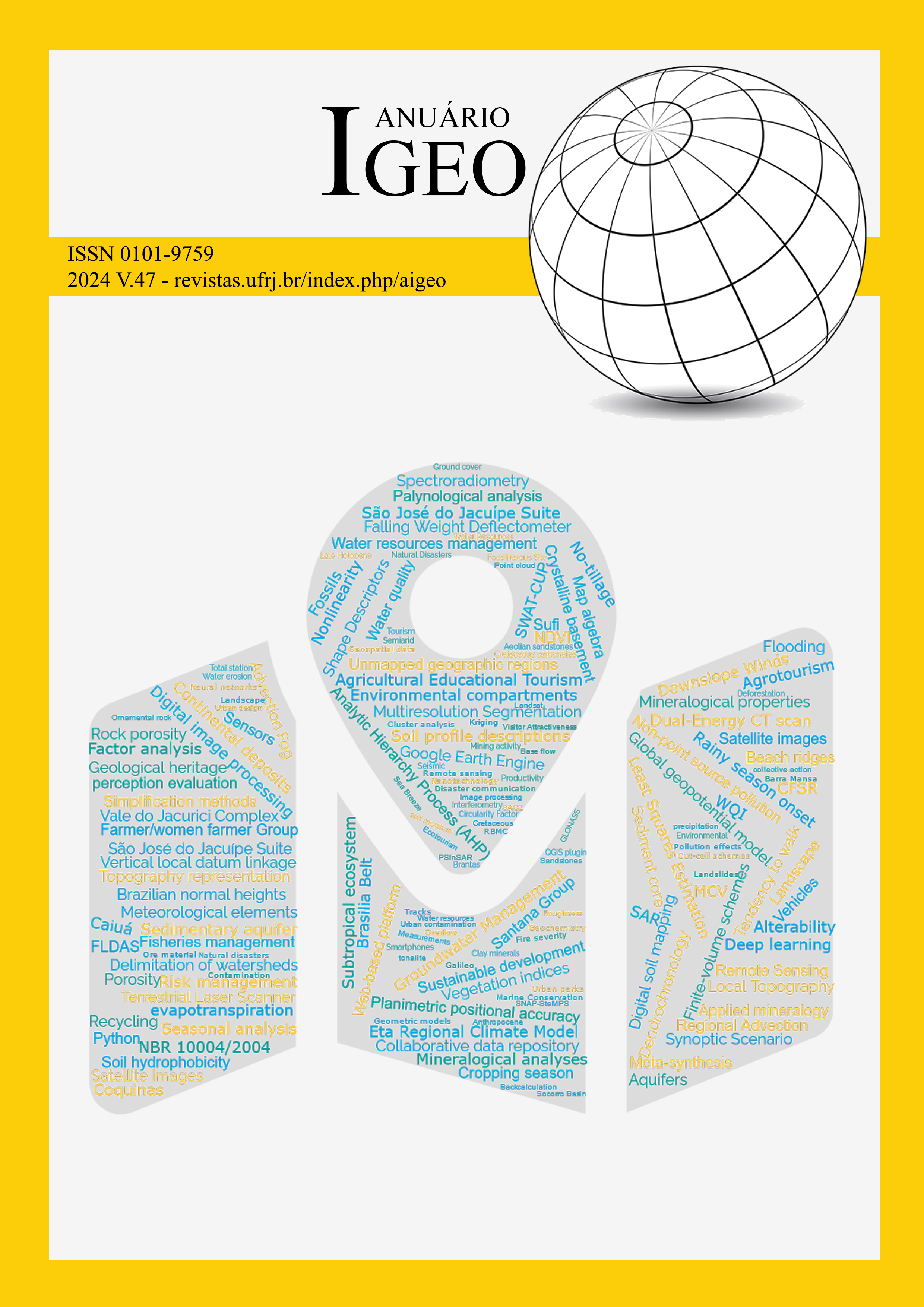Involvement of Millennial Farmers in the Implementation of Integrated Agriculture in Trenggalek District, East Java, Indonesia
DOI:
https://doi.org/10.11137/1982-3908_2024_47_60967Keywords:
Agribusines, Sustainable Agricultural, Young FarmersAbstract
Millennial farmers are the future of farmer regeneration in Indonesia. The involvement of millennial farmers is expected to be a driver in sustainable agricultural development. A study analyzed the factors influencing millennial farmers' interest and the types of entrepreneurship prioritized in implementing integrated farming (IF) in the Trenggalek Regency. The sample selection method used was the Simple Randomized and Clustered Sampling method. The research respondents were 110 millennial farmers who are members of farmer groups aged 17-39. Data were collected using an ordinal scale questionnaire. Data were analyzed using descriptive statistics, ordinal logistic regression, and Analytical Hierarchy Process (AHP). To overcome the declining interest of millennials in agricultural entrepreneurship, subjective norms or psychological factors such as motive factors and expectation factors need to be considered. These factors can be used as a basis for millennial farmers in choosing priorities for agricultural entrepreneurship. Agro-processing is the leading choice of types of entrepreneurship for millennial farmers, namely Solid Organic Fertilizer, Liquid Organic Fertilizer, Biourine, Probiotics, Vegetable Pesticides, Trichoderma, Refugia, Straw Amofer, and Magot. The priority of agricultural entrepreneurship that has the opportunity to be developed by the millennial generation of agriculture in Trenggalek Regency is agro-industrial entrepreneurship.
Downloads
References
Ahmad, Y. and Pirzada, D.S. (2014) ‘Using analytic hierarchy process for exploring prioritization of functional strategies in auto parts manufacturing SMEs of Pakistan’, SAGE Open, 4(4). Available at: https://doi.org/10.1177/2158244014553560.
Alkhazaleh, R., Mykoniatis, K. and Alahmer, A. (2022) ‘The Success of Technology Transfer in the Industry 4.0 Era: A Systematic Literature Review’, Journal of Open Innovation: Technology, Market, and Complexity, 8(4), p. 202. Available at: https://doi.org/10.3390/joitmc8040202.
Bagheri, M. et al. (2021) ‘Application of Multi-Criteria Decision-Making Model and Expert Choice Software for Coastal City Vulnerability Evaluation’, Urban Science, 5(4), pp. 1–28. Available at: https://doi.org/10.3390/urbansci5040084.
Canco, I., Kruja, D. and Iancu, T. (2021) ‘Ahp, a reliable method for quality decision making: A case study in business’, Sustainability (Switzerland), 13(24), pp. 1–14. Available at: https://doi.org/10.3390/su132413932.
Dale H. Schunk, M.K.D. (2020) ‘Self-efficacy and human motivation’, Advances in Motivation Science. Greensboro, NC, United States: # 2020 Elsevier Inc., pp. 1–25. Available at: https://doi.org/https://doi.org/10.1016/bs.adms.2020.10.001 #.
Dreyer, C. and Stojanová, H. (2023) ‘How entrepreneurial is German Generation Z vs. Generation Y? A Literature Review’, Procedia Computer Science, 217, pp. 155–164. Available at: https://doi.org/10.1016/j.procs.2022.12.211.
Godelnik, R. (2017) ‘Millennials and the sharing economy: Lessons from a “buy nothing new, share everything month” project’, Environmental Innovation and Societal Transitions, 23, pp. 40–52. Available at: https://doi.org/10.1016/j.eist.2017.02.002.
Hassoun Nedjar, N., Djebbar, Y. and Djemili, L. (2023) ‘Application of the analytical hierarchy process for planning the rehabilitation of water distribution networks’, Arab Gulf Journal of Scientific Research [Preprint]. Available at: https://doi.org/10.1108/AGJSR-07-2022-0110.
Herdhiansyah, D. et al. (2022) ‘Analytical hierarchy process (AHP) in Expert Choice for determining superior plantation commodities: A case in East Kolaka Regency, Indonesia’, Songklanakarin Journal of Science and Technology, 44(4), pp. 923–928. Available at: https://doi.org/10.14456/sjst-psu.2022.123.
Hossain, M.I. et al. (2023) Entrepreneurial intentions of Gen Z university students and entrepreneurial constraints in Bangladesh, Journal of Innovation and Entrepreneurship. Springer Berlin Heidelberg. Available at: https://doi.org/10.1186/s13731-023-00279-y.
Kontogeorgos, A. et al. (2014) ‘“New Farmers” a Crucial Parameter for the Greek Primary Sector: Assessments and Perceptions’, Procedia Economics and Finance, 14(14), pp. 333–341. Available at: https://doi.org/10.1016/s2212-5671(14)00721-7.
O’Keefe, P.A. and Harackiewicz, J.M. (2017) ‘The science of interest’, The Science of Interest, pp. 1–232. Available at: https://doi.org/10.1007/978-3-319-55509-6.
Pang, E. et al. (2019) ‘Competencies for fresh graduates’ success at work: Perspectives of employers’, Industry and Higher Education, 33(1), pp. 55–65. Available at: https://doi.org/10.1177/0950422218792333.
Pessotto, A.P. et al. (2019) ‘Factors influencing intergenerational succession in family farm businesses in Brazil’, Land Use Policy, 87(July), p. 104045. Available at: https://doi.org/10.1016/j.landusepol.2019.104045.
Ryan, R.M. and Deci, E.L. (2020) ‘Intrinsic and extrinsic motivation from a self-determination theory perspective: Definitions, theory, practices, and future directions’, Contemporary Educational Psychology, 61. Available at: https://doi.org/10.1016/j.cedpsych.2020.101860.
Saaty, R.W. (2016) Decision Making in Complex Environments, The Analytic Network Process (ANP) for Dependence and Feedback Including a Tutorial for The SuperDecisions Software and Portions of The Encyclicon of Applications, Including a Tutorial for the SuperDecisions Software and Portions of the Encyclicon of Applications. Available at: https://www.superdecisions.com/sd_resources/v28_man02.pdf.
Salas, E. et al. (2012) ‘The Science of Training and Development in Organizations: What Matters in Practice’, Psychological Science in the Public Interest, Supplement, 13(2), pp. 74–101. Available at: https://doi.org/10.1177/1529100612436661.
Shahzad, M.A., Abubakr, S. and Fischer, C. (2021) ‘Factors affecting farm succession and occupational choices of nominated farm successors in Gilgit‐Baltistan, Pakistan’, Agriculture (Switzerland), 11(12), pp. 1–17. Available at: https://doi.org/10.3390/agriculture11121203.
Tavana, M., Soltanifar, M. and Santos-Arteaga, F.J. (2021) Analytical hierarchy process: revolution and evolution, Annals of Operations Research. Available at: https://doi.org/10.1007/s10479-021-04432-2.
Urhahne, D. and Wijnia, L. (2023) Theories of Motivation in Education: an Integrative Framework, Educational Psychology Review. Springer US. Available at: https://doi.org/10.1007/s10648-023-09767-9.
Wilkinson, J. and Rocha, R. (2008) ‘The Agro-Processing Sector : Empirical Overview , Recent Trends and Development Impacts.Plenary paper: Global Agro-industries Forum, April, 2008 (FAO/UNIDO/IFAD/Indian Government)’, (November 2015). Available at: https://www.researchgate.net/publication/228896033%0AThe.
Wong, L.H. et al. (2020) ‘IDC theory: interest and the interest loop’, Research and Practice in Technology Enhanced Learning, 15(1). Available at: https://doi.org/10.1186/s41039-020-0123-2.
Wulf, G. and Lewthwaite, R. (2016) ‘Optimizing performance through intrinsic motivation and attention for learning: The OPTIMAL theory of motor learning’, Psychonomic Bulletin and Review, 23(5), pp. 1382–1414. Available at: https://doi.org/10.3758/s13423-015-0999-9.
Yiga, S. et al. (2023) ‘Exhibiting entrepreneurial behavior at work: a lived experience of a millennial entrepreneur’, Journal of Work-Applied Management [Preprint], (June). Available at: https://doi.org/10.1108/JWAM-04-2023-0033.
Downloads
Published
How to Cite
Issue
Section
License
Copyright (c) 2024 Anuário do Instituto de Geociências

This work is licensed under a Creative Commons Attribution 4.0 International License.
This journal is licensed under a Creative Commons — Attribution 4.0 International — CC BY 4.0, which permits use, distribution and reproduction in any medium, provided the original work is properly cited.















